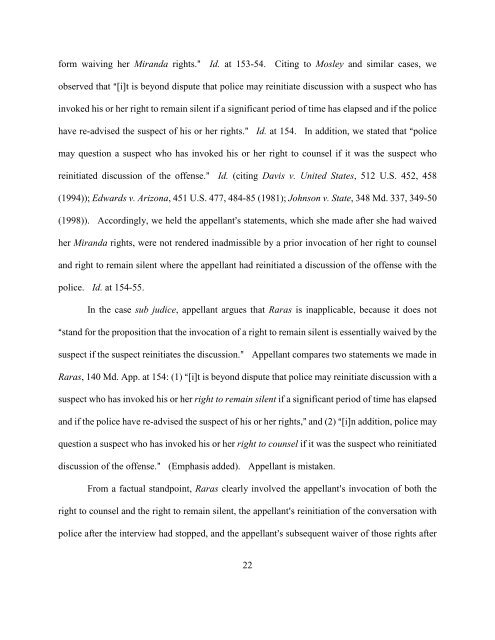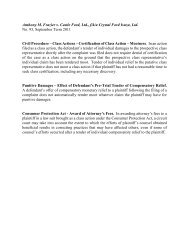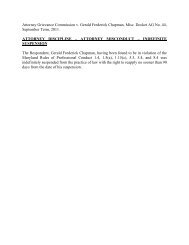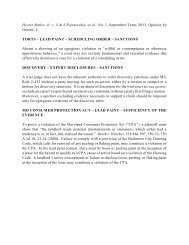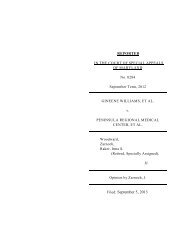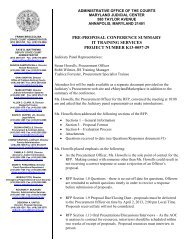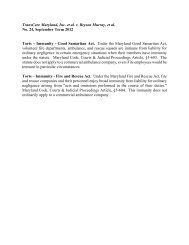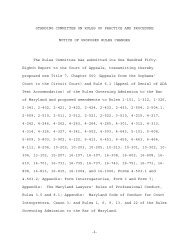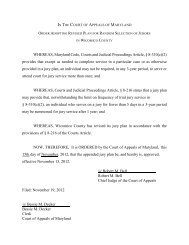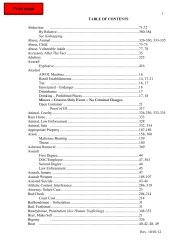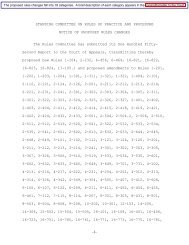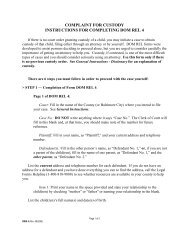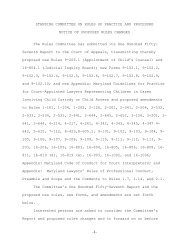2842/09 - Maryland Courts
2842/09 - Maryland Courts
2842/09 - Maryland Courts
You also want an ePaper? Increase the reach of your titles
YUMPU automatically turns print PDFs into web optimized ePapers that Google loves.
form waiving her Miranda rights.@ Id. at 153-54. Citing to Mosley and similar cases, we<br />
observed that A[i]t is beyond dispute that police may reinitiate discussion with a suspect who has<br />
invoked his or her right to remain silent if a significant period of time has elapsed and if the police<br />
have re-advised the suspect of his or her rights.@ Id. at 154. In addition, we stated that Apolice<br />
may question a suspect who has invoked his or her right to counsel if it was the suspect who<br />
reinitiated discussion of the offense.@ Id. (citing Davis v. United States, 512 U.S. 452, 458<br />
(1994)); Edwards v. Arizona, 451 U.S. 477, 484-85 (1981); Johnson v. State, 348 Md. 337, 349-50<br />
(1998)). Accordingly, we held the appellant=s statements, which she made after she had waived<br />
her Miranda rights, were not rendered inadmissible by a prior invocation of her right to counsel<br />
and right to remain silent where the appellant had reinitiated a discussion of the offense with the<br />
police. Id. at 154-55.<br />
In the case sub judice, appellant argues that Raras is inapplicable, because it does not<br />
Astand for the proposition that the invocation of a right to remain silent is essentially waived by the<br />
suspect if the suspect reinitiates the discussion.@ Appellant compares two statements we made in<br />
Raras, 140 Md. App. at 154: (1) A[i]t is beyond dispute that police may reinitiate discussion with a<br />
suspect who has invoked his or her right to remain silent if a significant period of time has elapsed<br />
and if the police have re-advised the suspect of his or her rights,@ and (2) A[i]n addition, police may<br />
question a suspect who has invoked his or her right to counsel if it was the suspect who reinitiated<br />
discussion of the offense.@ (Emphasis added). Appellant is mistaken.<br />
From a factual standpoint, Raras clearly involved the appellant=s invocation of both the<br />
right to counsel and the right to remain silent, the appellant=s reinitiation of the conversation with<br />
police after the interview had stopped, and the appellant=s subsequent waiver of those rights after<br />
22


